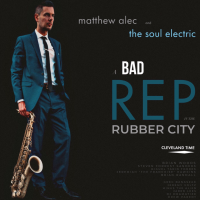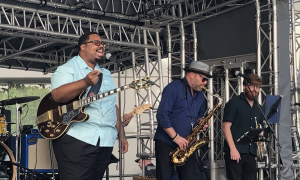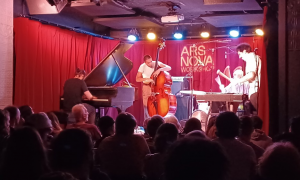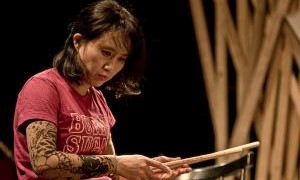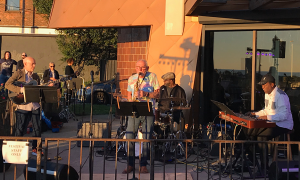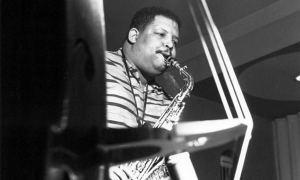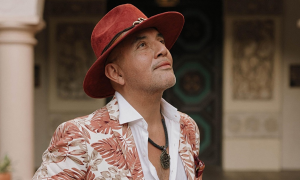Home » Jazz Articles » Live Review » 3rd Zbigniew Seifert International Jazz Violin Competition
3rd Zbigniew Seifert International Jazz Violin Competition

I think that the violin is actually the jazz instrument of the future, because itÀ₤s maybe the most beautiful instrument. We need more jazz violinists.
—John Scofield, Guitarist/Composer
Krzysztof Penderecki European Centre for Music
Luslawice/Krak´Ûw Poland
July 25-28, 2018
"An international jazz violin competition? Really?" That is usually came as a surprise to the applicants, and eventual participants themselves, that an international jazz violin competition should exist says a lot about the rarity of such an event. Yet as the bi-annual Zbigniew Seifert International Jazz Violin Competition has demonstrated, there is certainly no shortage of truly outstanding jazz violinists in the world. The first two editions of the competition—which debuted in 2014—surprised even the judges, so impressed were they with the level of talent on show. The third edition, held as before in the Krzysztof Penderecki European Centre for Music in Luslawice, was no exception.
With uniformly excellent performances, the twelve finalists, hailing from North America, Europe and the Middle East, provided good-sized headaches for the esteemed panel of judges,

Mark Feldman
violin
Michal Urbaniak
violin
Erik Friedlander
cellob.1960
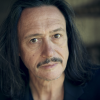
Dominique Pifarély
violinEntertainment? From its earliest days jazz was a music of entertainment, a mantle it hasn't quite shrugged off. Over the decades jazz has also assumed an altogether more artsy, high-brow image, and the music presented by twelve world-class violinists during the three days of competition was much more than just an agreeable diversion. For the competition finalists, professional musicians all, it represents not only a way of life, but a livelihood. For the winner, 10,000 Euros and the chance to record a CD was motivation enough to do something fairly unnatural for the majority of musicians—that's to say, compete.
Then there is the prestige that comes with winning such an event. The Zbigniew Seifert International Jazz Violin Competition may be the only one of its kind, but already, in just three editions, it has gained an international reputation. Most of this year's finalists had heard of the competition through word of mouth. Whilst competition is anathema to most musicians, a first prize in the bag from a prestigious competition is often the first item on their bios. So, there was a lot at stake during four days of intensive practise and performance.
The dual aims of the competition, founded by the Zbigniew Seifert Foundation, are to promote outstanding young musicians (violinists, cellists and violists) and to promote the legacy of Zbigniew Seifert, the virtuoso Polish violinist who died aged 32, in 1979. Like nearly all this year's competition participants, Seifert was classically trained before switching to jazz. A key member of

Tomasz Sta´§ko
trumpet1942 - 2018
The recent, exciting discovery of a long-lost recording of Seifert's short-lived, jazz-fusion band Variospheres, resulted in the release Variospheres: Live in Solothurn (Zbigniew Seifert Foundation, 2017). These CD releases and reissues, together with the English translation of Aneta Norek-Skrycka's Seifert biography, Man of the Light: The Life and Work of Zbigniew Seifert (Zbigniew Seifert Foundation, 2016), are playing a significant role in promoting Seifert's legacy -not only to an international audience, but within his native Poland as well.
To an older jazz generation, in the pre-CD era, Seifert was well respected by his peers on both sides of the Atlantic. Those his time was short, Seifert recorded with the likes of

Eberhard Weber
bassb.1940
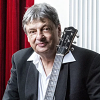
Philip Catherine
guitarb.1942

Joachim Kuhn
pianob.1944

Cecil McBee
bassb.1935

Billy Hart
drumsb.1940

Charlie Mariano
saxophone, alto1923 - 2009

Jack DeJohnette
drumsb.1942

John Scofield
guitarb.1951
In a nice piece of symmetry, Scofield, along with

John Medeski
organ, Hammond B3b.1965
Semi Finals Day One
Master of ceremonies Janusz Jablonski of Polish National Radio introduced the backing trio for the competition. Pianist
Dominik Wania
piano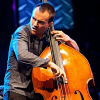
Max Mucha
bass, acoustic
Dawid Fortuna
drums
Zbigniew Namyslowski
saxophone, altob.1939
Janusz Muniak
saxophone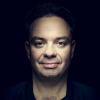
Maciej Obara
saxophoneb.1981

Piotr Damasiewicz
trumpetb.1980

Anna Maria Jopek
vocalsb.1970

Aga Zaryan
vocals
Pawel Kaczmarczyk
pianob.1984
Tadas De?ukas
Lithuanian violinist Tadas De?ukas' background in jazz, rock, electronic, contemporary folk and classical came through in a fine performance on electric violin of very contemporary hue. De?ukas stamped his personal mark on Seifert's "Turbulent Plover" with a solo spare in notes but big on atmosphere, his long, woozy notes delivered with painterly gravitas. Without pause, De?ukas embarked on an unaccompanied exploration, where looped drone formed the backdrop to a solo of dark lyricism. Silencing the drone, De?ukas played a lulling pizzicato melody with deft touch. This arresting pizzicato bled into "Sprout," the rhythm section's infectious, slow-funk groove providing the canvas for De?ukas seductively measured solo. Wania followed suit, upping the energy levels, before handing back to De?ukas, who's snaking, bluesy improvisation once again eschewed show-stopping fireworks in favor of raw, from-the-gut emotion.C´Îcile Delzant
Italy-based French violinist C´Îcile Delzant studied at both the Royal College of Music of London and the Conservatory Giuseppe Verdi of Turin, yet despite years dedicated to studying classical violin, Delzant abandoned those studies to throw herself into jazz and improvised music, though folk music has also long been a passion. Opening with Seifert's fiery "Passion," Delzant gave a brief but articulate solo before handing the reins to Wania. The two traded back and forth, but it was really on the next two compositions that Delzant's musicality best shone through. On
Billy Strayhorn
piano1915 - 1967
Youenn Rohaut
Like Zbigniew Seifert, French violinist Youenn Rohaut found early inspiration in the language of
John Coltrane
saxophone1926 - 1967

Michael Brecker
saxophone, tenor1949 - 2007

Jean-Luc Ponty
violinb.1942

Wayne Shorter
saxophone1933 - 2023
A walking-bass rhythm and pizzicato melody on violin announced "Witch Hunt," sans piano accompaniment. Rohaut wasted little time in employing his pedal board to effect spacious, synth-like strokes, a characteristic soundscape that punctuated his quite lyrical solo. Musically more ambitious was Rohaut's interpretation of "Footprints," which, melodic head apart, bore little relation to the original. Once again, Wania sat out, allowing more space for Rohaut—and Fortuna—to explore, but Wania's acute harmonic sensitivity might have added depth to this essentially uncluttered rendition. The pianist returned for Seifert's tune, his comping alone lending wings to Rohaut, whose impressive solo, devoid of showboating, relied instead on narrative flow to captivate. The final word went to Fortuna, whose bustling, polyrhythmic solo made for a striking finale.
George Dimitriu
With two albums as leader and as a member of
Kaja Draksler
pianob.1987
Marcin Halat
A graduate of the Faculty of Jazz and Popular Music in Katowice, Marcin Halat was a member of the renowned
Atom String Quartet
violinGabriel Terracciano
It was the playing of
Joe Venuti
violin1903 - 1978

Brad Shepik
guitar
Cole Porter
composer / conductor1891 - 1964

Cecil McBee
bassb.1935
Semi Finals Day Two
Layth Sidiq
Iraq-born, raised in Jordan and currently based in Boston, Layth Sidiq is a classically trained violinist who has made an international career with his highly personal musical language -one that encompasses classical, jazz and Middle Eastern sonorities. Amongst many projects, Sidiq plays in
Danilo Pérez
pianob.1966
Francisco Palaz´Ûn Gonz´Âlez,
Madrid-born Francisco Palaz´Ûn Gonz´Âlez is a musical all-rounder. Classically trained, he has only recently, since 2013 in fact, begun to explore other musical styles, including jazz, manouche jazz and flamenco. Two original compositions plus Seifert's "Quo Vadis" made up his set. Palaz´Ûn Gonz´Âlez' harmonically striking intro to "The Walk" foreshadowed a folksy tune that swung between vibrant rhythmic mantra and soaring improvisation. Wania's tumbling solo led the quartet back to familiar rhythmic ground and, after passionate collective discourse, a gentle touchdown. The lively "Outside," infused with Iberian flavors, saw both Palaz´Ûn Gonz´Âlez and Wania take impressive solos. The violinist's dramatic riffing fueled a rhythmically charged finale, the Spaniard signing off with a delightfully acrobatic musical figure. It was arguably on Seifert' "Quo Vadis" that Palaz´Ûn Gonz´Âlez gave best account of himself, notably in his captivating unaccompanied intro—melodically and harmonically arresting—as well as in his impassioned soloing.Amalia Obr?bowska
Amalia Obr?bowska only turned her attention to jazz and improvisation in 2013, although her affair with the violin began at the age of seven. Classical studies followed, but since that turning point in 2013 Obr?bowska has juggled both idioms. As of 2017, Obr?bowska began studying in the Fryderyk Chopin University of Music in Warsaw. For this semi-final appearance Obr?bowska offered two original compositions plus Seifert's "Turbulent Plover." The first composition, "Mind Traveler" saw Obr?bowska hand the initiative early to Mucha and Fortuna, before wresting control with a seductive solo of free-flowing lyricism, her voice seeming to add a subtle harmonic edge to her playing. A quiet pocket ushered in Wania, who delivered a dashing solo. A joint violin and piano vamp served as the canvas for another tremendous solo from Fortuna. Obr?bowska's interpretation of Seifert's powerhouse "Turbulent Plover" inevitably drew an animated solo from Obr?bowska, though there was little that was predictable about her highly personal voice, powerful yet eschewing facile theatrics. Obr?bowska's beguiling, unaccompanied intro to "Promien" set the tone for an engaging quartet journey that moved effortlessly from ballad to more rhythmically dynamic terrain. At whatever tempo, however, Obr?bowska exuded lyricism of the most persuasive kind.Benjamin "Benni" von Gutzeit
Born into musical family in Bochum, Germany, Benjamim von Gutzeit has played viola since the age of four, and has been an international touring musician since he was fourteen. Jazz soon caught his ear and he took Jazz Studies at the Conservatory of Amsterdam. A New York resident since 2010, von Gutzeit became the first violist to earn a Master's Degree from the Jazz Department of the Manhattan School of Music. He has been a member of the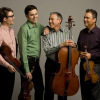
Turtle Island Quartet
band / ensemble / orchestraGreg Byers
The sole cellist of this year's semi-final, Greg Byers began studying the instrument at The Family Suzuki School of Rochester at the tender age of two and a half. Fast forward to 2010 and the Frost School of Music where Byers became the first person to double major in Instrumental Performance/Studio Music & Jazz on cello and bass, graduating Summa Cum Laude, no less. Byers leads his own projects as well as freelancing, and released his debut EP, Some Dark, Beautiful Morning in 2011. For this performance Byers began with the cello-piano composition "Falling Grace" by
Steve Swallow
bassb.1940

Charles Mingus
bass, acoustic1922 - 1979
Mario Forte
Algeria-born but a true world citizen, the much-traveled Mario Forte was appearing in his second Seifert Competition, having finished third in the second edition in 2016. Associate Professor of Music at the University of Lausanne, Switzerland, Mario is now based in New York City and has been a key member of
Richard Bona
bass, electricb.1967
The hall emptied and the judges retired to consider the twelve performances of the semi-finals. Several hours later all the musicians assembled to hear the results, announced by Michal Urbaniak. The five finalists selected to advance to the next day's finale were: Benjamin von Gutzeit; Layth Sidiq; Gabriel Terracciano; Mario Forte and C´Îcile Delzant.
Day Three: Final
The main hall of the Krzysztof Penderecki European Centre for Music was fairly packed for the final -a completely different atmosphere to the more sparsely attended semi-finals. Janusz Jablonski once again introduced the judges and welcomed Agnieska Seifert-Beck, widow of Zbigniew Seifert, who rose to acknowledge the warm applause. Jablonksi also welcomed Daniel Trutt, whose family generously made available to the Seifert Foundation an archival recording of Zbigniew Seifert's short-lived band Variospheres in 1976, which was released as Variospheres: Live in Solothurn (Zbigniew Seifert Foundation, 2018). Finally, Jablonksi introduced the Dominik Wania Trio, who had performed brilliantly over the previous two days. The formalities over, the final got underway before an attentive audience.Benjamin von Gutzeit
Von Gutzeit chose two jazz classics,
Thelonious Monk
piano1917 - 1982

Joe Henderson
saxophone1937 - 2001
Layth Sidiq
Layth Sidiq wasted no time in warming up, launching into the lively original tune "The Fog," one of two original compositions. Drawing on the melody of an Arabic tune, Sidiq's seductive playing interwove Middle Eastern and Western tonalities to stirring effect. The finale, with bowed bass, rumbling mallets, high-register piano stirrings and softly singing violin, had an achingly poetic quality. Sidiq raised his own bar still higher on the unaccompanied "Letter to Paco," a moving tribute to
Paco de Lucia
guitar1947 - 2014
Gabriel Terracciano
Gabriel Terracciano opened his final account with a violin and drum dialogue that announced Coltrane's harmonically dense "26-2." Wania was the first to solo, over Mucha's fast-walking bass and Fortuna's industry, before Terracciano picked up the thread. Unfortunately, his pick-up was not properly placed, resulting in a slightly distant, tinny sound. This technical glitch, however, didn't detract from Terracciano's playing -adventurous but always melodic. For Carl Fischer/Bill Carey's "You've Changed," Terracciano adjusted his pick-up and restored his true sound. A nicely edgy exchange with Wania blossomed into collective lyricism, with Fortuna's brushes underpinning Terracciano's delightfully laid-back,
Stephane Grappelli
violin1908 - 1997
Mario Forte
Choosing "Chinatown"—one of Seifert's lesser known tunes—to begin the final with, was a bold move from Forte, but perhaps in keeping with a musician who had stood out for his personal approach to the violin and to the jazz/improvised idiom. The up-tempo nature of the composition provided Forte with the opportunity to really extend himself, which he did to spectacular effect. In an uninterrupted performance, Forte built upon a delicate, unaccompanied pizzicato motif, injecting rhythmic gusto with the intervention of the trio. Pedal effects colored a contemporary,
Pat Metheny
guitarb.1954
C´Îcile Delzant
Last, but by no means least, C´Îcile Delzant once more offered a bold programme that, in addition to Seifert's "Man of the Light," also presented
Ornette Coleman
saxophone, alto1930 - 2015
Who would be a judge? The difficult task of deciding the three winners took the panel of judges a couple of hours. Once more, the musicians assembled and, after congratulating all five finalists, Michal Urbaniak revealed the results. In no particular order—the placing of first, second and third would take place the next night at a gala evening in Krak´Ûw-the names of Gabriel Terracciano, Mario Forte and Layth Sidiq were announced. Cheers and applause rang out form those gathered and all the musicians warmly embraced and congratulated the three musicians.
Gala Night: Announcement of Winner
The following morning a bus departed for Krak´Ûw with the musicians. There was the guts of the day to explore the handsome streets of the city before gathering at Kijow Centrum, a former cinema turned concert hall, for the announcement of first, second and third place in the competition. The emcee for the evening, as for the previous three days, Janusz Jablonski, introduced a number of dignitaries, including the Zbigniew Seifert Foundation's President, Aneta-Norek- Skrycka. As the event was being televised by Polish National Television all the speeches and presentations were, naturally enough, delivered in Polish.Before the three violinists learnt of their final positions, Amalia Obr?bowska was presented with the audience prize, as voted by those who watched the semi-finals. The popular vote for Obr?bowska was well merited, and indeed, she could consider herself a little unlucky not to have advanced to the final. The third place prize in the 3rd Zbigniew Seifert International Violin Competition went to Gabriel Terracciano. Second place was awarded to Layth Sidiq. First place went to Mario Forte. The three musicians each played a composition, backed as ever by the tireless Dominik Wania Trio. Perhaps, with the tension of competition gone, all three violinists played quite beautifully, and with a spirit of freedom. There then followed a short intermission, a breather before a very special concert.
John Scofield, John Medeski & The Konglomerat Big Band
Fittingly, the program of the nineteen-piece Konglomerat Big Band saw special arrangements of Zbigniew Seifert's compositions, with each arrangement by a different member of the band. The participation of
John Scofield
guitarb.1951
A Scofield and Medeski duet, "Dedicated to Zbiggy," was in fact a blues-edged reworking of "Summertime." Medeski, on piano, and Scofield, both took extended solos, though there was little in the way of interplay, with Medeski maintaining a vampish rhythm as Scofield soloed, and the guitarist laying out as Medeski stepped up. Scofield wove quietly mesmeric lines on an epic arrangement of "Where Are You From?, with Medeski feverish organ improvisation equally persuasive. A West African groove colored the intro to the vibrant "Spring on the Farm," which featured Scofield, and an excellent trombone solo.
"I was so lucky to get to play with Zbiggy, almost forty years ago," Scofield told the crowd between songs. "I'll never forget when I got the chance to play with him because it was really my first chance to play a kind of modern jazz that I was practising and working on, and he heard that in me." Scofield praised the competition organizers and the musicians themselves. "I think that the violin is actually the jazz instrument of the future, because it's maybe the most beautiful instrument. We need more jazz violinists." There was just time for a passionate version of "Turbulent Plover"—so popular among the competition's contestants in the first three editions—with layered brass lines making for an a colorful arrangement. The encore, "Coral," a quite distinct version form the opening number, saw lively closing statements from Scofield, and Medeski on piano, but the final word went to the collective voice of the excellent Konglomerat Big Band.
Wrap-up
Congratulations must go to Mario Forte. It was brave, having finished third two years ago, to enter the competition again, as the risk of greater disappointment was always a possibility. With perseverance and great self-belief, Forte triumphed, and most would say deservedly so; a highly talented musican of whom we are likely to hear much more in the future. Congratulations too, to Layth Sidiq and Gabriel Terracciano, for their outstanding performances. Equally, congratulations are also due to all the other contestants for making the 3rd Sbigniew Seifert International Jazz Violin Competition such a wonderful event. It's a rare privilege to hear so many world-class jazz/ improvising string players at such close quarters.Judging by the record number of applicants for the competition, the increased number of contestants and the large audience for the final in Luslawice, the Zbigniew Seifert International Violin Competition is going from strength to strength. In an event of this magnitude, there are many people involved behind the scenes, including all those who work throughout the year for the Zbigniew Seifert Foundation. However, for the four days of this year's completion, the tireless efforts of organizers Aneta Norek-Skrycka, Magdalena Warejko and Tomasz Handzik, to ensure that everything ran as smoothly as possible, must be applauded. It is largely thanks to their efforts that the name of Zbigniew Seifert is gaining lasting international renown.
The 4th Zbigniew Seifert International Violin Competition will be held in 2020. For violinist, violists and cellists interested in applying, keep an eye open for updates on the Zbigniew Seifert Foundation website.
This article is dedicated to the memory of Janusz Stefa´§ski and Tomasz Sta´§ko.
Photo Credit: Courtesy of the Zbigniew Seifert Foundation.
Tags
Comments
PREVIOUS / NEXT
Support All About Jazz
 All About Jazz has been a pillar of jazz since 1995, championing it as an art form and, more importantly, supporting the musicians who make it. Our enduring commitment has made "AAJ" one of the most culturally important websites of its kind, read by hundreds of thousands of fans, musicians and industry figures every month.
All About Jazz has been a pillar of jazz since 1995, championing it as an art form and, more importantly, supporting the musicians who make it. Our enduring commitment has made "AAJ" one of the most culturally important websites of its kind, read by hundreds of thousands of fans, musicians and industry figures every month.
Go Ad Free!
To maintain our platform while developing new means to foster jazz discovery and connectivity, we need your help. You can become a sustaining member for as little as $20 and in return, we'll immediately hide those pesky ads plus provide access to future articles for a full year. This winning combination vastly improves your AAJ experience and allow us to vigorously build on the pioneering work we first started in 1995. So enjoy an ad-free AAJ experience and help us remain a positive beacon for jazz by making a donation today.

Krakow
Concert Guide | Venue Guide | Local Businesses
| More...
Krakow Concerts
Sep
15
Mon
Ma?ek IQ Project
Globus Music Club
Krak´Ûw, Poland
Sep
16
Tue
Ma?ek IQ Project
Globus Music Club
Krak´Ûw, Poland
Sep
18
Thu
6. Konkurs Gitarowy im. Jarka ?mietany: Common Ground
Harris Piano Jazz Bar
Krakow, Poland
Sep
20
Sat
Koncert Laureatów i Gwiazd 6. Konkursu Gitarowego...
Filharmonia Im. Karola Szymanowskiego
Krak´Ûw, Poland
Oct
15
Wed
Kovacs
Klub Studio
Krak´Ûw, Poland
Oct
16
Thu

Diana Krall
House Of Music And Dance
Zabrze, Poland
Oct
17
Fri

Chris Botti
National Polish Radio Symphony Orchestra
Katowice, Poland
Oct
20
Mon

Sting
Tauron Arena
Krak´Ûw, Poland
Oct
21
Tue

Sting
Prezero Arena Gliwice
Gliwice, Poland
Oct
23
Thu

Marcus Miller - Ikony Jazzu
Cavatina Hall
Bielsko-Bia?a, Poland

Krakow
Concert Guide | Venue Guide | Local Businesses | More...Ma?ek IQ Project
Globus Music ClubKrak´Ûw, Poland
Ma?ek IQ Project
Globus Music ClubKrak´Ûw, Poland
6. Konkurs Gitarowy im. Jarka ?mietany: Common Ground
Harris Piano Jazz BarKrakow, Poland
Koncert Laureatów i Gwiazd 6. Konkursu Gitarowego...
Filharmonia Im. Karola SzymanowskiegoKrak´Ûw, Poland
Kovacs
Klub StudioKrak´Ûw, Poland

Diana Krall
House Of Music And DanceZabrze, Poland

Chris Botti
National Polish Radio Symphony OrchestraKatowice, Poland

Sting
Tauron ArenaKrak´Ûw, Poland

Sting
Prezero Arena GliwiceGliwice, Poland

Marcus Miller - Ikony Jazzu
Cavatina HallBielsko-Bia?a, Poland






 Buy Now
Buy Now




